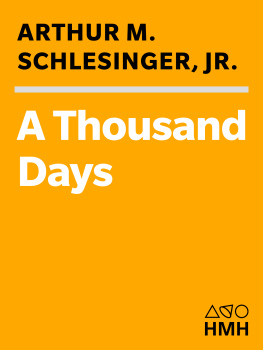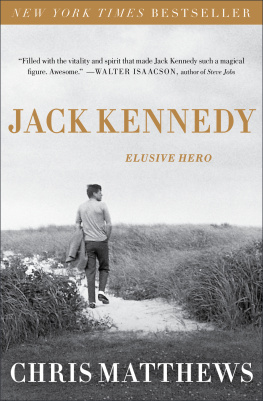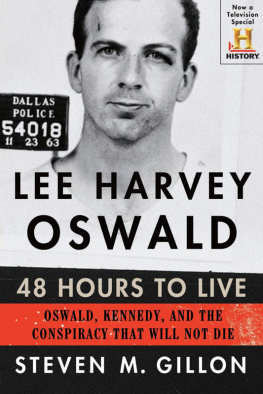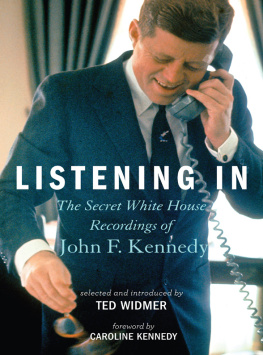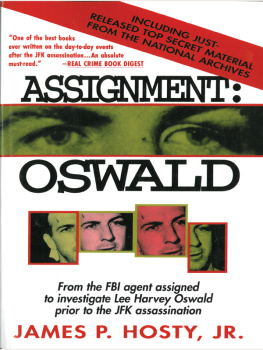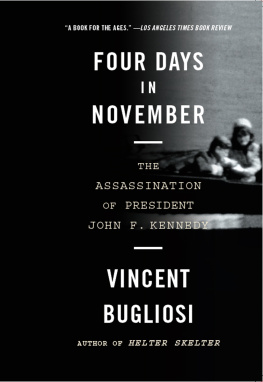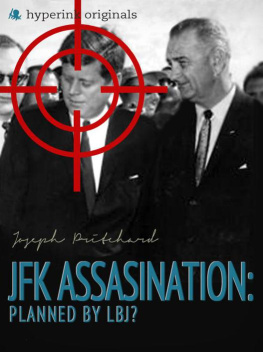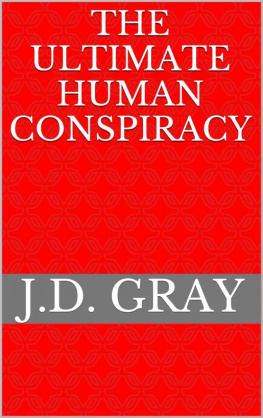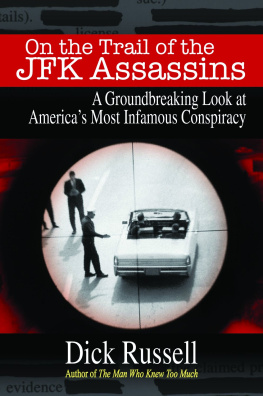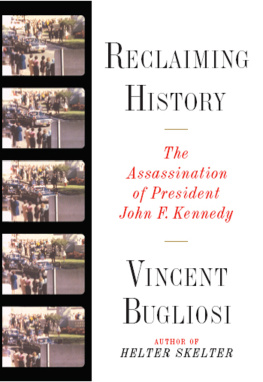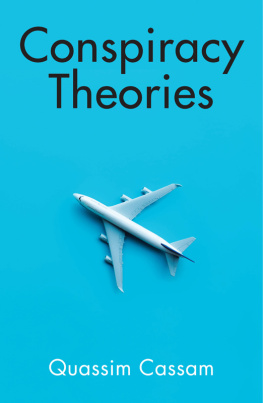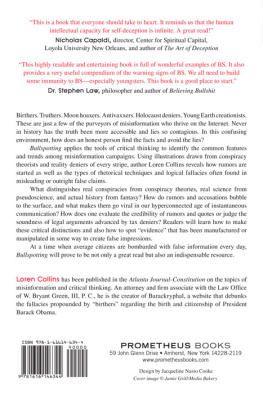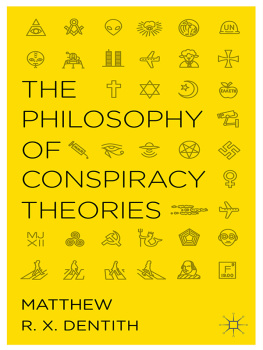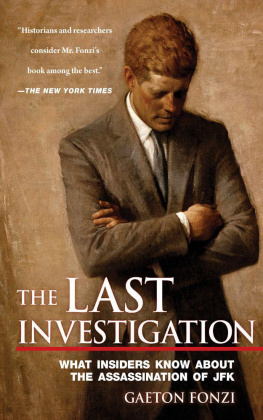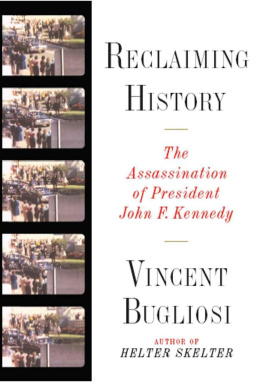JFK ASSASSINATION LOGIC
RELATED TITLES FROM POTOMAC BOOKS
The Forgotten Terrorist: Sirhan Sirhan and
the Assassination of Robert F. Kennedy
by Mel Ayton
A Farewell to Justice: Jim Garrison, JFKs Assassination,
and the Case That Should Have Changed History
by Joan Mellen
John F. Kennedy: World Leader
by Stephen G. Rabe
JFK ASSASSINATION LOGIC
HOW TO THINK ABOUT CLAIMS OF CONSPIRACY
John McAdams

Copyright 2011 by Potomac Books, Inc.
Published in the United States by Potomac Books, Inc. All rights reserved. No part of this book may be reproduced in any manner whatsoever without written permission from the publisher, except in the case of brief quotations embodied in critical articles and reviews.
Library of Congress Cataloging-in-Publication Data
McAdams, John, 1945
JFK assassination logic : how to think about claims of conspiracy / John
McAdams.1st ed.
p. cm.
Includes bibliographical references and index.
ISBN 978-1-59797-489-9 (hardcover: alk. paper)
ISBN 978-1-59797-579-7 (electronic edition)
1. Kennedy, John F. (John Fitzgerald), 19171963Assassination. 2. Conspiracies
United StatesHistory20th century. I. Title.
E842.9.M38 2011
364.15dc22
2011013869
Printed in the United States of America on acid-free paper that meets the American National Standards Institute Z39-48 Standard.
Potomac Books
22841 Quicksilver Drive
Dulles, Virginia 20166
First Edition
10 9 8 7 6 5 4 3 2 1
Contents
Acknowledgments
These acknowledgments will be briefer than is often the case in books of this sort, simply because of the difficulty of listing (or even recalling) everybody who has helped in some substantial way with this project. But I want to especially mention a cadre of JFK assassination researchers who have thoroughly investigated one or a few issues and essentially settledto the satisfaction of any reasonable personthe issues they have tackled. Typically these researchers have published their work only in obscure JFK assassination journals, or on the Internet (especially on the newsgroup alt.assassination.jfk). But each has contributed to clearing away the mass of factoids, misinformation, and dubious claims that have littered the historical landscape.
These people include Dave Reitzes, Stephen Roy (aka Blackburst), Russ Burr, Todd Wayne Vaughan, Dave Perry, Mike Russ, Clint Bradford, Tony Marsh, Mark Zaid, Gordon Winslow, Barb Junkkarinen, Dale Myers, and Bob Artwohl. Add to these folks authors like Jean Davison (who published the splendid book Oswalds Game and continues to make valuable contributions), Josiah Thompson (who published the best of all conspiracy books, Six Seconds in Dallas, and likewise continues to research), and Patricia Lambert (who published the definitive treatment of Jim Garrisons investigation in New Orleans). Lambert and author Max Holland provided me hugely valuable support and advice in the early stages of this project.
Some people play a vastly valuable role behind the scenes, and Paul Hoch (longtime Berkeley researcher) and Gary Mack (curator of the Sixth Floor Museum in Dallas) stand out.
A couple of people have done splendid work making resources available to researchers: Jim Lesar of the Assassination Archives and Research Center, and Rex Bradford of the Mary Ferrell Foundation. The foundations website contains a mass of primary source documents that have been used in this book, and indeed other recent assassination books.
Steven Dhuey read this manuscript and made a variety of extremely valuable suggestions and improvements.
Several of my Marquette research assistants have contributed to the project, but the three who have worked on it most recently and most intensively are Ethan Bercot, Matt Surey, and Brett McCaw. Among earlier research assistants, Magen Knuth stands out as having done excellent work and having written some fine essays for my website.
Three editors at Potomac Books, Elizabeth Demers, Vicki Chamlee, and Julie Gutin, helped move this project along to completion.
Finally, there is my wife, Lynda, who read Priscilla McMillans Marina and Lee and became convinced that her husbands obsession is not such an odd one after all.
Preface
This is not a book telling you what to think about conspiracy theories. Instead, it provides advice on how to think about conspiracy theories. It mostly discusses the assassination of John F. Kennedy, since JFK theories are the iconic American conspiracy theories. They are also the ones the author knows best. But if you know how to think about one conspiracy theory, you will know how to approach just about all of them.
If you know how fragile witness testimony is as evidence, you will probably bring the appropriate skepticism to witness accounts supporting a 9/11 U.S. government conspiracy or sightings of Bigfoot or UFOs. If you know how clueless government bureaucrats can be, you wont so readily accept that a supposed smoking gun document proves what a conspiracy theorist says it proves. If you know how common it is for photographs to be misinterpreted, you will tend to ask, do these apparent anomalies in photos supposedly shot on the surface of the moon really show fakery?
I am going to be up-front: I dont think a conspiracy was involved in Kennedys death. People who believe in a conspiracy and read this book wont necessarily and indeed probably wontchange their minds. But hopefully they will reject many bogus conspiracy arguments and evidence, even while holding out for a particular piece of evidence or some tantalizing unanswered question that might be the tip-off to covert shenanigans. The fact that illogic and the misuse of evidence are frequently behind conspiracy theories doesnt mean they always are. After all, there are real conspiracies in the world. Watergate was one, and so was the plot to kill Abraham Lincoln and members of his cabinet. Those theories that can survive critical scrutiny can be the basis of a reasonable discussion among reasonable people.
Most of what I say here might seem to be little more than common sense even when using a bit of jargon to express the idea (for example, ad hoc assumptions). But to repeat an old platitude, common sense can be amazingly uncommon. In this book, I will show the reader how to evaluate conspiracy theories. If the testimony of a witness doesnt seem quite right, the reader will know all the ways that the testimony might be wrong, ranging from outright lies (and well discuss several witnesses who have almost certainly been lying) to alleged memories reconstructed from diverse elements to bizarre statements that are typical of honest perceptions of traumatic and highly stressful events.
Everybody knows that writers, newscasters, and producers of documentaries can mislead their audiences by leaving out certain information. The reader of this book may be dismayed to discover how often these omissions happen.
If I say that ones conclusions should be based on the most reliable evidence and not on the least reliable evidence, that instruction will seem like an obvious truism. But the reader is likely to be surprised at the amount of evidence that will have to be disregarded when using this approach. With most key issues, one or two killer pieces of evidence will determine what we conclude. Conspiracy books, however, typically throw a bunch of stuff against the wall, hoping some of it will stick and create suspicion. Books fingering Lee Oswald as the lone assassin typically provide a coherent narrative but often embrace evidence thats not too reliable. In contrast, I stress the need to focus on the hard data. That material should determine the conclusion.
Next page

